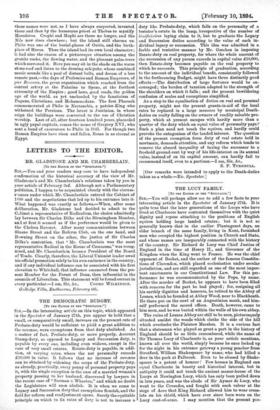LETTERS TO THE EDITOR.
MR. GLADSTONE AND MR. CHAMBERLAIN.
[To THE EDITOR OF THE "SPECTATOR.'] SIR,—You and your readers may care to have independent confirmation of the historical accuracy of the view of Mr. Gladstone's and Mr. Chamberlain's relations taken by you in your article of February 3rd. Although not a Parliamentary, politician, I happen to be acquainted closely with the circum- eancee under which Mr. Chamberlain entered the Cabinet of 1880 and the negotiations that led up to his entrance into it- What happened was exactly as follows,—When, after some deliberation, Mr. Gladstone had decided to admit to the Cabinet a representative of Radicalism, the choice admittedly lay between Sir Charles Dilke and the Birmingham Member, and at first it seemed as if the preference would be given to the Chelsea Baronet. After many communications between Sloane Street and the Reform Club, on the one hand, and Downing Street on the other, the justice of Sir Charles Dilke's contention, that "Mr. Chamberlain was the most representative Radical in the House of Commons," was recog- nised, and Mr. Chamberlain became President of the Board of Trade. Clearly, therefore, the Liberal Unionist leader owed his official promotion solely to his own eminence in the country; and if any individual influence can be associated with his first elevation to Whitehall, that influence emanated from the pre- sent Member for the Forest of Dean, then influential in the councils of Liberalism. This statement will be found correct in






































 Previous page
Previous page